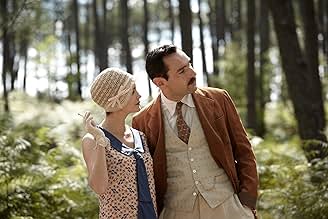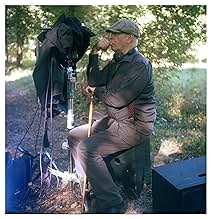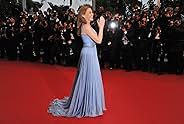An unhappily married woman struggles to break free from social pressures.An unhappily married woman struggles to break free from social pressures.An unhappily married woman struggles to break free from social pressures.
- Director
- Writers
- Stars
- Awards
- 5 nominations total
- Director
- Writers
- All cast & crew
- Production, box office & more at IMDbPro
Featured reviews
This film is about a blue blooded woman marrying a tycoon, but quickly finds out that marriage is not a thing she likes.
The title "Thérèse Desqueyroux" doesn't give the plot away, but the Hong Kong Chinese title does. As a result, I kept guessing how the plot will turn out. Initially, we see Thérèse having a rather entangled relationship with Anne, which may or may not have played a part in her dissatisfaction in Thérèse's subsequent marriage. Then, the marriage itself is portrayed well, with the husband giving Thérèse much love that is clearly not reciprocated.
However, all these supposed seeds that led to the deed did not adequately explain Thérèse's criminal action. Without a plausible motive, I was left to wonder exactly why she did such a horrible deed. Such a lack of motive may drive suspense and keep viewers on edge, but in "Thérèse Desqueyroux" it only serves to confuse.
In addition, the subplot between Thérèse and Anne, and between Anne and Jean were left hanging, which was quite a pity. The amazing contrasts between the pre-deed, post-deed and liberated Thérèse could not help to lift "Thérèse Desqueyroux" to becoming a great film. I think it is a good film but it is unfortunately masked by hanging subplots and confusion.
The title "Thérèse Desqueyroux" doesn't give the plot away, but the Hong Kong Chinese title does. As a result, I kept guessing how the plot will turn out. Initially, we see Thérèse having a rather entangled relationship with Anne, which may or may not have played a part in her dissatisfaction in Thérèse's subsequent marriage. Then, the marriage itself is portrayed well, with the husband giving Thérèse much love that is clearly not reciprocated.
However, all these supposed seeds that led to the deed did not adequately explain Thérèse's criminal action. Without a plausible motive, I was left to wonder exactly why she did such a horrible deed. Such a lack of motive may drive suspense and keep viewers on edge, but in "Thérèse Desqueyroux" it only serves to confuse.
In addition, the subplot between Thérèse and Anne, and between Anne and Jean were left hanging, which was quite a pity. The amazing contrasts between the pre-deed, post-deed and liberated Thérèse could not help to lift "Thérèse Desqueyroux" to becoming a great film. I think it is a good film but it is unfortunately masked by hanging subplots and confusion.
This excellent film, like the novel, has a challengingly "modern", existential feel, with themes that bring it closer to the ideas of Camus and Sartre than many of Mauriac's other works.
Thérèse isn't really sure why she acts in the way she does, but her character, thanks largely to Tautou's performance, is so complex and nuanced that, far from leading to "confusion", as another reviewer has suggested, it simply seems real. Perhaps too "real" to be hugely dramatic, but real enough to be compelling and fascinating.
Gilles Lellouche plays husband Bernard to perfection, too, with just the right amount of odious materialism and hypocrisy, combined with a tinge of genuine sympathy. He genuinely can't comprehend his wife and her actions, and responds in the way that he thinks best.
The movie is beautifully and atmospherically shot - the best compliment I can pay is that it looks just how I imagined it when I read the book. Plus it made me want to read the novel again, because it reminded me just how powerful and "modern" a work it is.
Despite the film's length, there are no "longueurs" (boring bits), and the plot feels surprisingly tight given the lack of action.
So watch this film, enjoy the "look", and be surprised and challenged by the characters and their motivations, and by just how modern Mauriac's ideas were, way back in the 1920s. Definitely recommended.
Thérèse isn't really sure why she acts in the way she does, but her character, thanks largely to Tautou's performance, is so complex and nuanced that, far from leading to "confusion", as another reviewer has suggested, it simply seems real. Perhaps too "real" to be hugely dramatic, but real enough to be compelling and fascinating.
Gilles Lellouche plays husband Bernard to perfection, too, with just the right amount of odious materialism and hypocrisy, combined with a tinge of genuine sympathy. He genuinely can't comprehend his wife and her actions, and responds in the way that he thinks best.
The movie is beautifully and atmospherically shot - the best compliment I can pay is that it looks just how I imagined it when I read the book. Plus it made me want to read the novel again, because it reminded me just how powerful and "modern" a work it is.
Despite the film's length, there are no "longueurs" (boring bits), and the plot feels surprisingly tight given the lack of action.
So watch this film, enjoy the "look", and be surprised and challenged by the characters and their motivations, and by just how modern Mauriac's ideas were, way back in the 1920s. Definitely recommended.
There are strong echoes of Madame Bovary and Anna Karenina in Claude Miller's film 'Therese Desqueyroux', derived from a 1920s novel about a woman trapped by convention in a stultifying marriage to a mediocre man. But where Emma Bovary is stupid, Therese is deeply intelligent; whereas Emma has an affair, Therese merely learns of that of her sister in law; and whereas Emma kills herself, Therese tries to murder her husband. In modern parlance, Therese is medically depressed; but while depression may lead to irrational behaviour, it is not itself necessarily without cause. In all these stories, one can feel ambiguous sympathy for the entitled husbands, who may not be likable per se, but who don't fully deserve the hand that fate deals them. There's a nice scene at the end of this film which neatly summarises Monsiuer Desqueyroux's utter emotional constipation. I also liked the way that the time and place (the Landes forest in south west France) are portrayed, and Audtey Tatou is very good in a role which is the opposite of cute.
Based on a french novel itself inspired by a true story. This is some sort of study of psychopathy. It can be in an apparently nice person.
'Thérèse Desqueyroux' is a French drama set in the 1920s in which Audrey Tautou, as the titular Thérèse, is content to play the iconoclast in her stuffy husband's family. But when her best friend (also her sister-in-law) describes her passionate relationship with an attractive young Portuguese man, Thérèse's emotions take a more sinister turn. My one complaint about this is that as Thérèse's husband (played by Gilles Lellouche) is such a central part of the plot it's a shame he is portrayed as such a one-dimensional duffer, ignorant of his wife's feelings in the most stereotypical way, but apart from that this is quite an enjoyable production, both in terms of the plot and the idyllic coastal scenery in which much of the film is set.
Did you know
- TriviaMauriac's novel is inspired by the Henriette Canaby attempted murder case (1906).
- ConnectionsReferenced in Not Going Out: Mugging (2014)
- SoundtracksNo 2 in A Flat (Andantino) [6 moments musicaux, Op. 94 D 780]
Written by Franz Schubert
Performed by Alfred Brendel
- How long is Thérèse?Powered by Alexa
Details
- Release date
- Country of origin
- Official site
- Language
- Also known as
- Bir Kadının Gözyaşı
- Filming locations
- Bonzac, Gironde, France(Desqueyroux castle)
- Production companies
- See more company credits at IMDbPro
Box office
- Budget
- $12,700,000 (estimated)
- Gross US & Canada
- $101,944
- Opening weekend US & Canada
- $20,050
- Aug 25, 2013
- Gross worldwide
- $4,408,087
- Runtime
- 1h 50m(110 min)
- Color
- Sound mix
- Aspect ratio
- 2.35 : 1
Contribute to this page
Suggest an edit or add missing content





























